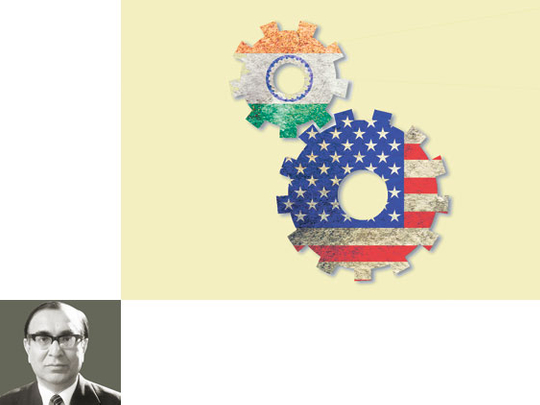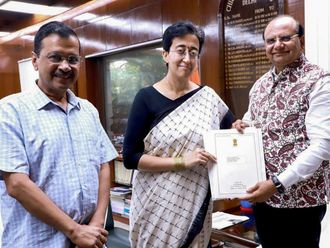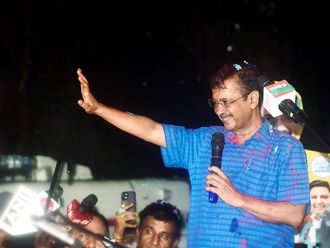
US Secretary of State Hillary Clinton has just concluded an extended visit to India, an important milestone in the growing collaboration between Washington and New Delhi. In June 2010, the two capitals launched the India-US Strategic Dialogue and Clinton had come to New Delhi for its second round. In between, President Barack Obama visited India in November 2010. The present dialogue will be noted for the explicitness with which the commonality of interests has been asserted in a ‘global partnership'. In recent times, India and the US have established a Central Asia, a West Asia, a UN, an East Asia dialogue and planned a trilateral Indo-US-Japan dialogue. It is a far cry from the day Obama landed in Beijing and upset India by asking the Chinese to co-manage the world with Washington. This time, in Chennai, Clinton pointedly asked India to lead Asia.
Many regional chancelleries would be figuring out if the sole superpower is enlisting Indian military and economic power to perpetuate American hegemony in Asia eroded by the trillion dollar wars in the Middle East and a deep-seated economic malaise of which the current debt crisis is just one dramatic manifestation. How far would India be willing to antagonise China with which its bilateral trade is climbing to a $60 billion (Dh220 billion) mark? Cooperation in exploiting the Central Asian energy and other mineral resources is understandable though China and Russia would continue to be serious competitors and India would be reluctant to alienate Moscow beyond a certain point. The facile extension of West Asia to the joint Indo-US zone of influence may well alarm the regional states, including India's close friend Iran that has grave issues with the United States. India is successfully pursuing its national interest in the vast swathe of Asia that Clinton has in mind and may not want to be labelled an America surrogate.
Multiple gains
While experts debate the interplay of rhetoric and reality during Clinton's visit, India would pragmatically consolidate its position in implementing the historic Indo-US nuclear accord, in accelerating transfer of sophisticated western technology to India, in improving the access of its IT experts to American markets and, above all, in retaining the United States as a source of sophisticated military hardware. It will also gain greatly in science and technology. India is strongly poised to take full advantage of opportunities to maintain its impressive growth rate despite the present Indian unease about corruption's impact on its emerging economy. In return, how far India can shore up the declining US strategic and economic hold on Asia remains highly uncertain.
Behind the vast architecture sketched during the Clinton visit which can only be dimly perceived at the moment, there were hard-boiled discussions on Afghanistan and Pakistan. Clinton came just before the visit to New Delhi of Pakistan's youngest-ever foreign minister, the 34-year-old Hina Rabbani Khar, trained in management sciences at Lahore and the United States.
Her visit is for mandatory consultations between foreign ministers during the cycle of meetings in the India-Pakistan dialogue with perhaps one difference: it may commence an informal bilateral exchange of views on Afghanistan where India and Pakistan remain intense rivals. Hina Khar is happily free of the prejudices of the older generation and it would be up to the seasoned 79-year-old Indian Foreign Minister S.M. Krishna to respond affably to this new voice from Pakistan.
The latest American agenda for Afghanistan — achieving a total rupture between a future Afghan government and the Al Qaida, a Kabul regime that signs a treaty for the indefinite stationing of a reduced American force to project power in all the four directions, co-opting of reconcilable Taliban and Pashtun nationalists, a primary, if not exclusive claim on disposing of the country's mineral wealth — cannot be achieved only with Indian collaboration. Certain aspects of this agenda depend much more on Pakistan's cooperation. Iran will not want to see its siege by the West prolonged by an indefinite American military presence in Afghanistan. Saudi assistance is needed to influence the Taliban and other religious militias and also bankroll the transition. The whirlwind visits by President Asif Ali Zardari to Kabul (twice), Tehran (twice) and Riyadh in a very short period are said to enjoy US backing despite an otherwise strained relationship. Afghanistan needs a broad regional concert and Washington's obsession to use India to contain and downgrade China would not create it.
Obama's policy reviews have failed to re-examine some of the fundamentals of American policies. We have not seen such reconsideration in the policy towards the Arab Middle East, the Israel-Palestinian contention over a viable two-state solution, Iran, Afghanistan and South Asia. Rightly or wrongly, the people of Pakistan blame the country's alliance with Washington for 35,000 dead in terrorist attacks and the country's shattered economy. By criticising Pakistan rather gratuitously on Indian soil, a sensitive issue, Clinton lost the Pakistani appreciation of her support for India-Pakistan dialogue. Unfortunately, history bears witness that great powers in decline often suffer from a growing deficit of statesmanship.
Tanvir Ahmad Khan is a former ambassador of Pakistan to several countries and its foreign secretary. Till recently, he was the Chairman of the Institute of Strategic Studies, Islamabad.










